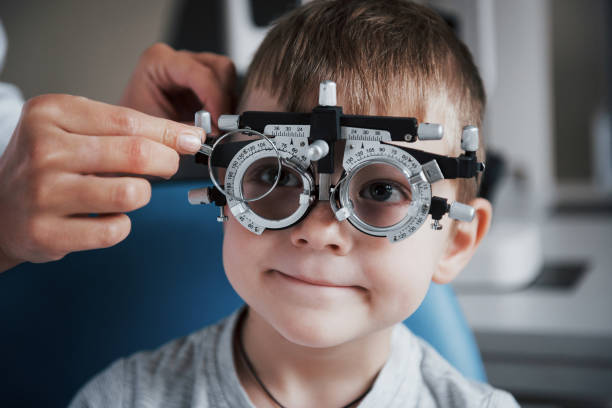Our eyes are one of the most important organs in our body, allowing us to see the world around us. Yet, we often take our eyesight for granted and don’t prioritize our eye health. In today’s digital age, we are constantly exposed to screens and artificial light, causing more strain on our eyes than ever before. This is why it’s essential to take proactive steps to keep our vision clear and sharp. In this article, we’ll explore five simple yet effective ways to improve your eye health. By following these practical tips, you’ll be able to see the world more clearly and take care of your eyes for years to come.
The Importance of Eye Health
Our eyes are a complex and delicate organ that requires proper care and attention. They allow us to see the world around us and experience the beauty of life. However, many of us neglect our eye health until we experience vision problems. According to the World Health Organization (WHO), globally, there are an estimated 2.2 billion people with vision impairment or blindness. This emphasizes the importance of taking care of our eyesight and prioritizing eye health.
There are many factors that can contribute to poor eye health, such as age, genetics, and lifestyle choices. Some of the most common eye problems include nearsightedness, farsightedness, astigmatism, and age-related macular degeneration. These conditions can significantly impact our quality of life, making it difficult to perform daily tasks or enjoy hobbies we once loved.
5 Simple Steps to Improve Your Eye Health
- Nutrition for Eye Health
Diet plays a crucial role in maintaining good eye health. Consuming a well-balanced diet rich in vitamins and minerals can help prevent eye diseases and conditions. Some of the essential nutrients for eye health include vitamin A, vitamin C, vitamin E, lutein, zeaxanthin, and omega-3 fatty acids. These nutrients can be found in foods such as leafy greens, citrus fruits, nuts, fish, and eggs.
Incorporating these foods into your diet can help protect your eyes from damage and maintain clear vision. Additionally, drinking plenty of water can help keep your eyes hydrated and reduce dryness.
- Eye Exercises to Improve Vision
Eye exercises can help improve vision and prevent eye strain. One simple exercise is the 20-20-20 rule: every 20 minutes, take a 20-second break and look at something 20 feet away. This helps reduce eye strain and fatigue caused by staring at a screen for long periods.
Another exercise is called palming. Rub your hands together to warm them up, then place your palms over your closed eyes. Hold this position for a few minutes, taking deep breaths. This helps relax the eye muscles and reduce tension.
- Importance of Regular Eye Exams
Regular eye exams are essential for maintaining good eye health. They can help detect eye problems early on and prevent further damage. Eye exams can also identify underlying health issues such as diabetes or high blood pressure.
It’s recommended to have a comprehensive eye exam every one to two years, depending on your age and risk factors. Children should have their first eye exam at six months old, then again at three years old and before starting school.
- Tips for Reducing Eye Strain
Eye strain is a common problem in today’s digital age. It can cause headaches, blurry vision, and dry eyes. To reduce eye strain, take frequent breaks from screens and adjust the lighting in your workspace. Use an anti-glare screen on your computer and position it at arm’s length, with the top of the screen at or below eye level.
Additionally, make sure to blink regularly to prevent dry eyes. If you wear contact lenses, take them out at the end of the day to give your eyes a break.
- Protecting Your Eyes from UV Rays
UV rays from the sun can cause damage to your eyes, leading to cataracts, macular degeneration, and other eye problems. To protect your eyes from UV rays, wear sunglasses that block 100% of UVA and UVB rays. Additionally, wear a hat or visor to shade your eyes from direct sunlight.
Lifestyle Changes for Better Eye Health
In addition to the above steps, there are several lifestyle changes you can make to improve your eye health. These include:
- Quitting smoking: Smoking can increase your risk of developing cataracts and macular degeneration.
- Getting enough sleep: Lack of sleep can cause eye fatigue and dryness.
- Exercising regularly: Exercise can improve blood flow and oxygen to the eyes, reducing the risk of eye problems.
- Managing chronic conditions: Conditions such as diabetes and high blood pressure can lead to eye problems if left untreated. It’s essential to manage these conditions to prevent further damage.
Conclusion
Our eyes are an essential part of our daily lives, and taking care of them should be a top priority. By following these simple steps, you can improve your eye health and prevent vision problems. Remember to eat a balanced diet, take regular breaks from screens, and protect your eyes from UV rays. Additionally, make sure to have regular eye exams to detect any problems early on. By taking care of your eyes, you can enjoy clear vision and experience the beauty of the world around you.
